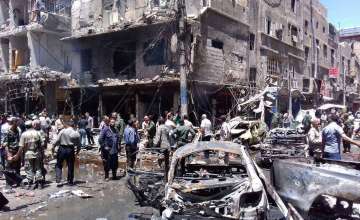Twin blasts near Damascus kill 12, Islamic State claims responsibility
Beirut: Two suicide bombers struck close to the Syrian capital Saturday, killing at least 12 people and wounding dozens more in the latest attack to hit the predominantly Shiite area in recent months, state TV

Beirut: Two suicide bombers struck close to the Syrian capital Saturday, killing at least 12 people and wounding dozens more in the latest attack to hit the predominantly Shiite area in recent months, state TV and an opposition activist group said.
The Islamic State group claimed responsibility for the bombings through its Aamaq news agency, which said there were three attacks carried out by suicide bombers.
Aamaq said two attackers were wearing explosive belts while the third was in a car.
Syrian State TV said the blasts in the Sayyida Zeinab area just south of Damascus killed 12 people and wounded 55 others.
The Britain-based Syrian Observatory for Human Rights said 20 people were killed and dozens were wounded in the two explosions.
The blasts came as U.S.-backed fighters in northern Syria tightened their siege on the IS stronghold of Manbij, where tens of the thousands of civilians are trapped by the fighting. The Syria Democratic Forces, a predominantly Kurdish group, encircled the town after capturing dozens of villages and farms near the Turkish border.
“The push toward Manbij slowed down because of fear for civilians there,” said Mustafa Bali, a Syrian journalist who visited the front line. “All telecommunications with the town have been cut,” he told The Associated Press by telephone.
The Observatory said tens of thousands of civilians in the town fear bombardment of residential areas at a time when most bakeries have stopped working and food is running out. It said airstrikes by the U.S.-led coalition have killed 30 civilians, including 11 children, since SDF began its offensive on May 31.
Manbij, one of IS’s largest strongholds in Syria’s Aleppo province, is a waypoint on a key supply line between the extremists’ de facto capital of Raqqa and the Turkish frontier.
The suburb where the bombing took place is home to a shrine by the same name, one of the most renowned in Shiite Islam.
The heavily guarded shrine to Sayyida Zeinab, the daughter of the first Shiite imam, Ali, and granddaughter of the Islamic Prophet Muhammad, receives thousands of Shiite pilgrims each year.
Read Also: Islamic State wants Kashmir under Caliphate, not Pakistan: Report
State TV aired footage from the blast site, showing several vehicles and shops on fire and at least two buildings whose balconies, doors and windows had been destroyed. Blood stains could be seen on the debris-covered road. Fire engines rushed to the scene to extinguish fires caused by the explosions.
State news agency SANA said the first blast was caused by a suicide attacker wearing an explosives belt, while the second was the result of a suicide attacker in a car rigged with explosives.
SANA quoted Prime Minister Wael al-Halqi as blaming the “brutal massacres” on Turkey, Saudi Arabia and Qatar, which are the main supporters of the Syrian rebels trying to remove President Bashar Assad from power.
Sayyida Zeinab has been a frequent target of bombings in Syria’s civil war, now in its sixth year.
On April 25, a suicide car bomb struck a military checkpoint, killing eight people, and in February, a series of blasts killed at least 83 people and wounded more than 170.
In the central province of Homs, a 31-truck aid convoy from the International Committee of the Red Cross and the Syrian Arab Red Crescent entered the besieged town of Houla on Saturday, according to ICRC spokesman Pawel Krzysiek.
Krzysiek said the trucks are carrying food for 14,200 families as well as products such as mattresses, blankets, water pumps, hygiene kits, diapers and vaccines. In March, 28 trucks carrying relief entered Houla, he said.
Earlier this week, the U.N. said the Syrian government had approved access to 15 of 19 besieged areas.
The U.N. estimates that 592,700 people live under siege in Syria, with about 452,700 of them under blockades by government forces. Lifting sieges on rebel-held areas was a key demand by the opposition during peace talks that failed earlier this year in Geneva.